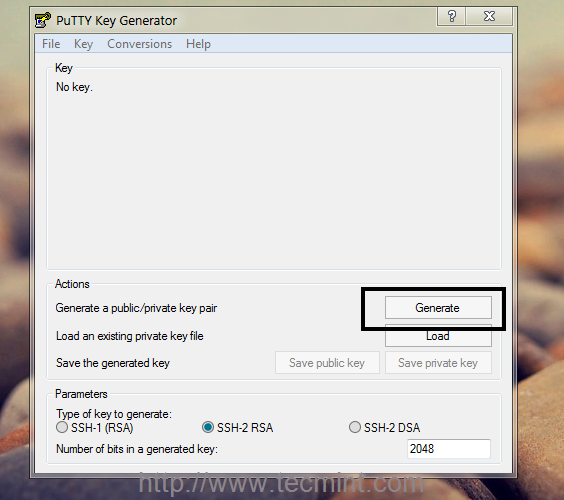Generate Ssh Key In Ubuntu
SSH key generator for Ubuntu closed Ask Question Asked 4 years, 7 months ago. How to generate SSH v2 key for ubuntu one. Ubuntu 18 Server with 2FA for SSH. SSH stands for “Secure Shell” and is an encrypted protocol used to log in and manage a remote server. SSH also supports various authentication mechanisms. We will show you how to set up SSH key-based authentication on an Ubuntu 18.04 server. Generate the SSH Key on the Client Machine. Jan 14, 2020 Key generation with PuTTY. Duration: 3:00. To generate a key pair with the PuTTY key generator, simply run puttygen.exe and click the Generate button in the window that appears. You will be asked to move the mouse and press keys to improve the. Jun 09, 2018 H ow do I regenerate OpenSSH sshd server host keys stored in /etc/ssh/sshhost. files? Can I safely regenerate ssh host keys using remote ssh session as my existing ssh connections shouldn’t be interrupted on Debian or Ubuntu Linux? Creating an SSH key on Windows 1. Check for existing SSH keys. You should check for existing SSH keys on your local computer. You can use an existing SSH key with Bitbucket Server if you want, in which case you can go straight to either SSH user keys for personal use or SSH access keys for system use. Open a command prompt, and run.
ow do I regenerate OpenSSH sshd server host keys stored in /etc/ssh/ssh_host_* files? Can I safely regenerate ssh host keys using remote ssh session as my existing ssh connections shouldn’t be interrupted on Debian or Ubuntu Linux? How do I regenerate new ssh server keys? How to regenerate new host keys on a Debian or Ubuntu Linux?- Apr 28, 2018 With Bash on Ubuntu on Windows, you can use a Windows Subsystem for Linux on Windows 10. With that, you can run many Linux commands, for example, ssh.This post shows you how to create an SSH key, which should be used on both, the Linux subsystem and Windows.
- Apr 28, 2017 SSH keys are a necessity for Python development when you are working with Git, connecting to remote servers and automating your deployments.Let's walk through how to generate SSH key pairs, which contain both a public and a private key within a single pair, on Ubuntu Linux.
[donotprint][/donotprint]To regenerate keys you need to delete old files and reconfigure openssh-server. It is also safe to run following commands
 over remote ssh based session. Your existing session shouldn’t be interrupted.
over remote ssh based session. Your existing session shouldn’t be interrupted.Why regenerate new ssh server keys?
Most Linux and Unix distribution create ssh keys for you during the installation of the OpenSSH server package. But it may be useful to be able re-generate new server keys from time to time. For example, when you duplicate VM (KVM or container) which contains an installed ssh package and you need to use different keys from cloned KVM VM guest/machine.
Steps to regenerate OpenSSH host keys on Linux
Let us see all steps
Step 1 – Delete old ssh host keys
Login as the root and type the following command to delete files on your SSHD server:# /bin/rm -v /etc/ssh/ssh_host_*
Sample outputs:
Step 2 – Debian or Ubuntu Linux Regenerate OpenSSH Host Keys
Generate Ssh Key Windows
Now create a new set of keys on your SSHD server, enter:# dpkg-reconfigure openssh-server
Sample output:
You just regenerated new ssh server keys. You need to restart ssh server:$ sudo systemctl restart ssh
OR$ /etc/init.d/ssh restart
Generate Ssh Key Ubuntu With Email
Step 3 – Update all ssh client(s) known_hosts files
Finally, you need to update ~/.ssh/known_hosts files on client computers, otherwise everyone will see an error message that read as follows:
Either remove host fingerprint or update the file using vi text editor (command must be typed on client machine):$ ssh-keygen -R remote-server-name-here
Now login using the ssh command:$ ssh vivek@server1.cyberciti.biz
Conclusion
Generate Ssh Key Putty
You just regenerated OpenSSH Host Keys on a Debian or Ubuntu Linux using the dpkg-reconfigure command. For more info see the man page or this wiki page here:$ man dpkg-reconfigure
$ man sshd
Create New Ssh Key
ADVERTISEMENTS
